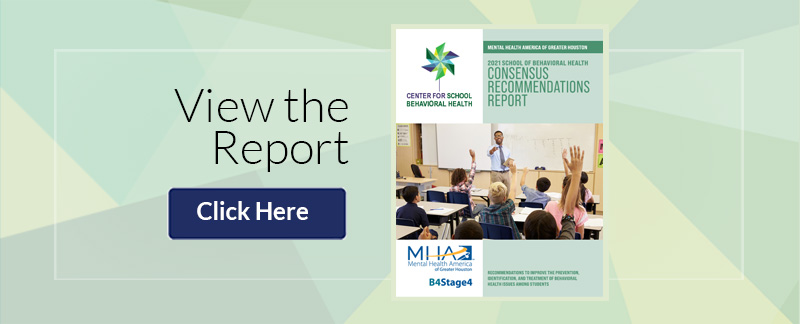2021 Center for School Behavioral Health Consensus Recommendations Report
The 2021 Consensus Recommendations Report is work that the Center for School Behavioral Health Collaborative convened to review and update the recommendations from 2013 and develop new recommendations that will continue to pursue systems change around school behavioral health.
Advocacy Area: By implementing our recommendations, you have the opportunity to increase access to mental and behavioral health services and supports, combat the school to prison and deportation pipeline, mitigate stigma related to mental health, acknowledge diverse identities, and enhance sense of belonging.
INCREASE ACCESS TO MENTAL AND BEHAVIORAL HEALTH SERVICES AND SUPPORTS

There is a growing unmet need for school behavioral and mental health services, which set the foundation for creating and sustaining safe and positive learning environments. Research shows that students who receive these services perform better behaviorally and academically. The recommendations work to increase these services by:
- Providing solutions to address the shortage of specialists in schools
- Encouraging partnerships with community providers and organizations
- Emphasizing the importance of improved reimbursement rates and sufficient coverage, and
- Raising awareness regarding the various avenues in which services can be accessed and maintained
Corresponding Recommendations #s in the Report:
1, 2, 4, 5, 6, 7,8,9, 10, 11, 15, 16, 17, 18, 19, 20, 21, 22, 23, 24, 25, 26, 27, 28, 31, 32, 34, 35, 36, 37
COMBAT SCHOOL TO PRISON AND DEPORTATION PIPELINE

Zero-tolerance policies, student criminalization, and other exclusionary school discipline policies push students out of the school system and into the criminal system or immigration agencies. By redirecting resources and funding to restorative practices, mental and behavioral health specialists, and other evidence-based practices to address student health, students can continue to learn within the classroom setting.
Corresponding Recommendations #s in the Report:
1, 2, 3, 4, 6, 7, 9, 10, 11, 13, 15, 17, 18, 20, 23, 25, 26, 27, 28, 29, 34
MITIGATE STIGMA RELATED TO MENTAL HEALTH

Stigma can create barriers for individuals with mental and behavioral health disorders that prevent them from seeking help or receiving treatment. Mitigating stigmas related to mental illness requires education about various disorders, understanding their impact on one’s daily life, and evaluating our own biases.
Corresponding Recommendations #s in the Report:
1, 5, 6, 10, 11, 15, 17, 18, 20, 23, 25, 26, 27, 28, 29, 30, 34
ACKNOWLEDGE DIVERSE IDENTITIES AND ENHANCE SENSE OF BELONGING

School belonging has a positive impact on students’ academic performance and wellbeing. However, school policies and practices can perpetuate individual and institutional violence, causing adverse effects on students’ self-esteem and sense of belonging. It is imperative to understand the relationship between students’ identities, sense of belonging, and academic achievement to ensure a healthy, productive learning environment.
Corresponding Recommendations #s in the Report:
8, 10, 12, 13, 15, 20, 25, 26, 27, 34
Recommendations History
In 2013, in collaboration with school district teachers and administrators, child-serving agencies, and mental health professionals, the Center for School Behavioral Health (CSBH) Collaborative developed and released a list of 37 recommendations to effect systems change in behavioral health for students. In partnership with districts in the Greater Houston area, various recommendations were implemented over a 7-year time period. Through the reviewal process and interviews with behavioral health clinicians and advocates, child-serving advocacy groups and educators within the Greater Houston area, metrics and implementation strategies for each recommendation were established.
School District Discipline Data Tables
From Interest to Action
How to move forward based on your personal talents and interests
Click here or scan the code to take the survey

Explore More of the Center for School Behavioral Health
CSBH Collaboration
Youth Art Showcase
Professional Development
Newsletter Archive


